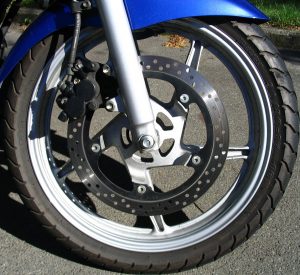Braking In Corners
Ask anyone who has ever ridden a motorcycle before about their top piece of braking advice and you’ll find that the answer is generally the same: It’s a wise idea to avoid the front brake when you’re in a corner, there are exceptions with practice. Motorcycle tyres can only provide you with so much grip; applying the front brake forces the tyre to find more traction where it might have none left, causing the tyre to lose its grip and slide away. If this happens to you, you’ll learn that it hurts the fast way.
Braking In The Wet
Braking in the wet, like riding in the wet, is a different ball game altogether. Normally, a rider can afford to split their braking between front and rear, usually with more braking effect by the front and in some cases almost 100% front; in the wet, there are so many differing variables that make this braking regime potentially unsafe. The slippery road surface can really reduce your traction, and if you’ve got little or limited traction, then your brakes aren’t going to be as effective. To combat this, it’s a wise idea to engage both brakes more equally although you should probably take the time to practice this in a safe environment and get to know your motorcycle and its individual brake set first.
Brake Reliance
After you’ve been riding for a while, you’ll find that you’ll develop your own style of braking; you may favour the front brake over the rear or stick with one brake fearful of the effects of using the other brake. We’ve heard of a rider that disconnected his front brake altogether, to stop himself from grabbing the front brake in a panic situation and locking his front wheel – we’ve never actually seen this but it’s amazing what fear of something can make someone do, although it could well just be an exaggerated story. If you’re favouring one brake over another, you’re probably not braking properly and you need to retrain yourself in the art of using both brakes. Using a combination of both brakes will definitely help you to slow down quicker; braking is more about weight distribution than actually stopping your wheels – think about which brake moves the weight where and you’ll get the idea. Now apart from that, you should think about a possible accident scenario: what if your usual brake fails? You’ll need to use your other one to deal with the problem. The front brake is stronger but if it goes, you’ll need to use more rear brake and a combination of engine braking too. If your rear brake goes, you’ll need to solely rely on the front, without locking up the front. Many bikes have linked brakes and other brake aids so it’s important that you get familiar with your bike, but remember when you get on a different bike it may be completely different.
Braking Distance
Road surfaces and weather conditions can greatly affect your braking ability. These days’ roads are in a poor state, pot holes, bad repairs, debris in the road and the usual badly positioned manhole covers. When your suspension is working hard dealing with uneven road surface it can’t help you brake as efficiently. Slippery roads can cause a loss of friction between the tyre and the road surface, diminishing your braking ability considerably. When you’re riding in the rain, don’t assume that your bike can stop in the usual distance, because usually it can’t. The best way to understand how your brakes work in these conditions is to take your bike out for a ride to a very quiet road and practice your braking abilities.
Brake Tests
Checking your brakes regularly should become a part of your regular riding routine. You should run a bit of regular maintenance through your machine by cleaning your discs after long rides (vent holes clog up with dirt for example) and checking the fluid levels. The majority of your checks need to be done whilst stationary and ideally before you head out on a ride but you can also perform a few tests whilst you’re on the road. Remember if you’ve been riding in heavy rain conditions with standing water this can effect them; if your brakes aren’t up to scratch then consider taking a slow ride home or checking into a mechanics as soon as possible.
Braking is one of the most important riding skills you can master and if you can brake appropriately in any situation, you should be able to avoid any potential accidents in the future.
Ride safe and enjoy your bike.
Think Bike Training team.
